The 97% consensus on global warming
What the science says...
| Select a level... |
 Basic
Basic
|
 Intermediate
Intermediate
|
 Advanced
Advanced
| ||||
|
Surveys of the peer-reviewed scientific literature and the opinions of experts consistently show a 97–98% consensus that humans are causing global warming. |
|||||||
There is no consensus
"[...] And I'll mention that the stat on the 97% of - of scientists is based on one discredited study." (Ted Cruz)
Authors of seven climate consensus studies — including Naomi Oreskes, Peter Doran, William Anderegg, Bart Verheggen, Ed Maibach, J. Stuart Carlton, and John Cook — co-authored a paper that should settle this question once and for all. The two key conclusions from the paper are:
1) Depending on exactly how you measure the expert consensus, it’s somewhere between 90% and 100% that agree humans are responsible for climate change, with most of our studies finding 97% consensus among publishing climate scientists.
2) The greater the climate expertise among those surveyed, the higher the consensus on human-caused global warming.
Expert consensus results on the question of human-caused global warming among the previous studies published by the co-authors of Cook et al. (2016). Illustration: John Cook. Available on the SkS Graphics page
Scientific consensus on human-caused global warming as compared to the expertise of the surveyed sample. There’s a strong correlation between consensus and climate science expertise. Illustration: John Cook. Available on the SkS Graphics page
Expert consensus is a powerful thing. People know we don’t have the time or capacity to learn about everything, and so we frequently defer to the conclusions of experts. It’s why we visit doctors when we’re ill. The same is true of climate change: most people defer to the expert consensus of climate scientists. Crucially, as we note in our paper:
Public perception of the scientific consensus has been found to be a gateway belief, affecting other climate beliefs and attitudes including policy support.
That’s why those who oppose taking action to curb climate change have engaged in a misinformation campaign to deny the existence of the expert consensus. They’ve been largely successful, as the public badly underestimate the expert consensus, in what we call the “consensus gap.” Only 16% of Americans realize that the consensus is above 90%.
The Consensus Project
The 2016 paper was a follow-up on Cook et al. (2013). This was a survey of over 12,000 peer-reviewed climate science papers by our citizen science team at Skeptical Science has found a 97% consensus in the peer-reviewed literature that humans are causing global warming.
The Abstracts Survey
The first step of our approach involved expanding the original survey of the peer-reviewed scientific literature in Oreskes (2004). We performed a keyword search of peer-reviewed scientific journal publications (in the ISI Web of Science) for the terms 'global warming' and 'global climate change' between the years 1991 and 2011, which returned over 12,000 papers. John Cook created a web-based system that would randomly display a paper's abstract (summary). We agreed upon definitions of possible categories: explicit or implicit endorsement of human-caused global warming, no position, and implicit or explicit rejection (or minimization of the human influence).
Our approach was also similar to that taken by James Powell, as illustrated in the popular graphic below. Powell examined nearly 14,000 abstracts, searching for explicit rejections of human-caused global warming, finding only 24. We took this approach further, also looking at implicit rejections, no opinions, and implicit/explicit endorsements.
We took a conservative approach in our ratings. For example, a study which takes it for granted that global warming will continue for the foreseeable future could easily be put into the implicit endorsement category; there is no reason to expect global warming to continue indefinitely unless humans are causing it. However, unless an abstract included (either implicit or explicit) language about the cause of the warming, we categorized it as 'no position'.
Note that John Cook also initiated a spinoff from the project with a survey of climate blog participants re-rating a subset of these same abstracts. However, this spinoff is not a part of our research or conclusions.
The Team
A team of Skeptical Science volunteers proceeded to categorize the 12,000 abstracts – the most comprehensive survey of its kind to date. Each paper was rated independently at least twice, with the identity of the other co-rater not known. A dozen team members completed most of the 24,000+ ratings. There was no funding provided for this project; all the work was performed on a purely voluntary basis.
Once we finished the 24,000+ ratings, we went back and checked the abstracts where there were disagreements. If the disagreement about a given paper couldn't be settled by the two initial raters, a third person acted as the tie-breaker.
The volunteers were an internationally diverse group. Team members' home countries included Australia, USA, Canada, UK, New Zealand, Germany, Finland, and Italy.
The Self-Ratings
As an independent test of the measured consensus, we also emailed over 8,500 authors and asked them to rate their own papers using our same categories. The most appropriate expert to rate the level of endorsement of a published paper is the author of the paper, after all. We received responses from 1,200 scientists who rated a total of over 2,100 papers. Unlike our team's ratings that only considered the summary of each paper presented in the abstract, the scientists considered the entire paper in the self-ratings.
The 97% Consensus Results
Based on our abstract ratings, we found that just over 4,000 papers expressed a position on the cause of global warming, 97.1% of which endorsed human-caused global warming. In the self-ratings, nearly 1,400 papers were rated as taking a position, 97.2% of which endorsed human-caused global warming.
We found that about two-thirds of papers didn't express a position on the subject in the abstract, which confirms that we were conservative in our initial abstract ratings. This result isn't surprising for two reasons: 1) most journals have strict word limits for their abstracts, and 2) frankly, every scientist doing climate research knows humans are causing global warming. There's no longer a need to state something so obvious. For example, would you expect every geological paper to note in its abstract that the Earth is a spherical body that orbits the sun?
This result was also predicted by Oreskes (2007), which noted that scientists
"...generally focus their discussions on questions that are still disputed or unanswered rather than on matters about which everyone agrees"
However, according to the author self-ratings, nearly two-thirds of the papers in our survey do express a position on the subject somewhere in the paper.
We also found that the consensus has strengthened gradually over time. The slow rate reflects that there has been little room to grow, because the consensus on human-caused global warming has generally always been over 90% since 1991. Nevertheless, in both the abstract ratings and self-ratings, we found that the consensus has grown to about 98% as of 2011.
Percentage of papers endorsing the consensus among only papers that express a position endorsing or rejecting the consensus. From Cook et al. (2013).
Our results are also consistent with previous research finding a 97% consensus amongst climate experts on the human cause of global warming. Doran and Zimmerman (2009) surveyed Earth scientists, and found that of the 77 scientists responding to their survey who are actively publishing climate science research, 75 (97.4%) agreed that "human activity is a significant contributing factor in changing mean global temperatures." Anderegg et al. (2010) compiled a list of 908 researchers with at least 20 peer-reviewed climate publications. They found that:
"≈97% of self-identified actively publishing climate scientists agree with the tenets of ACC [anthropogenic climate change]"
In our survey, among scientists who expressed a position on AGW in their abstract, 98.4% endorsed the consensus. This is greater than 97% consensus of peer-reviewed papers because endorsement papers had more authors than rejection papers, on average. Thus there is a 97.1% consensus in the peer-reviewed literature, and a 98.4% consensus amongst scientists researching climate change.
Why is this Important?
Several studies have shown that people who correctly perceive the scientific consensus on human-caused global warming are more likely to support government action to curb greenhouse gas emissions. This was most recently shown in McCright et al. (2013), recently published in the journal Climatic Change. People will defer to the judgment of experts, and they trust climate scientists on the subject of global warming.
However, research has also shown that the public is misinformed on the climate consensus. For example, a 2012 poll from US Pew Research Center found less than half of Americans thought that scientists agreed that humans were causing global warming. One contributor to this misperception is false balance in the media, particularly in the US, where most climate stories are "balanced" with a "skeptic" perspective. However, this results in making the 3% seem much larger, like 50%. In trying to achieve "balance", the media has actually created a very unbalanced perception of reality. As a result, people believe scientists are still split about what's causing global warming, and therefore there is not nearly enough public support or motivation to solve the problem.
Such false balance has long been the goal of a dedicated misinformation campaign waged by the fossil fuel industry. Just as one example, in 1991 Western Fuels Association conducted a $510,000 campaign whose primary goal was to "reposition global warming as theory (not fact)." These vested interests have exploited the media desire to appear "balanced."
Open Access for Maximum Transparency
We chose to submit our paper to Environmental Research Letters because it is a well-respected, high-impact journal, but also because it offers the option of making a paper available by open access, meaning that for an up-front fee, the paper can be made free for anybody to download. This was important to us, because we want our results to be as accessible and transparent as possible.
To pay the open access fee, in keeping with the citizen science approach, we asked for donations from Skeptical Science readers. We received over 50 donations in less than 10 hours to fully crowd-fund the $1,600 open access cost.
Human-Caused Global Warming
We fully anticipate that some climate contrarians will respond by saying "we don't dispute that humans cause some global warming." First of all, there are a lot of people who do dispute that there is a consensus that humans cause any global warming. Our paper shows that their position is not supported in the scientific literature.
Second, we did look for papers that quantify the human contribution to global warming, and most are not that specific. However, as noted above, if a paper minimized the human contribution, we classified that as a rejection. For example, if a paper were to say "the sun caused most of the global warming over the past century," that would be included in the less than 3% of papers in the rejection categories.
Many studies simply defer to the expert summary of climate science research put together by the Intergovernmental Panel on Climate Change (IPCC), which states that most of the global warming since the mid-20th century has been caused by humans. According to recent research, that statement is actually too conservative.
Of the papers that specifically examine the human and natural causes of global warming, virtually all conclude that humans are the dominant cause over the past 50 to 100 years.
Net human and natural percent contributions to the observed global surface warming over the past 50-65 years. The studies are Tett et al. 2000 (T00, dark blue), Meehl et al. 2004 (M04, red), Stone et al. 2007 (S07, green), Lean and Rind 2008 (LR08, purple), Huber and Knutti 2011 (HK11, light blue), Gillett et al. 2012 (G12, orange), Wigley and Santer 2012 (WG12, dark green), Jones et al. 2013 (J13, pink), IPCC AR5 (IPCC, light green), and Ribes et al. 2016 (R16, light purple). The numbers in this summary are best estimates from each study; uncertainty ranges can be found in the original research.
Most studies simply accept this fact and go on to examine the consequences of this human-caused global warming and associated climate change.
Another important point is that once you accept that humans are causing global warming, you must also accept that global warming is still happening; humans cause global warming by increasing the greenhouse effect, and our greenhouse gas emissions just keep accelerating. This ties in to our previous posts noting that global warming is accelerating; but that over the past decade, most of that warming has gone into the oceans (including the oft-neglected deep oceans). If you accept that humans are causing global warming, as over 97% of peer-reviewed scientific papers do, then this conclusion should not be at all controversial. With all this evidence for human-caused global warming, it couldn't simply have just stopped, so the heat must be going somewhere. Scientists have found it in the oceans.
Spread the Word
Awareness of the scientific consensus on human-caused global warming is a key factor in peoples' decisions whether or not to support action to reduce greenhouse gas emissions. However, there is a gap here due to the public's lack of awareness of the consensus. Thus it's critical that we make people aware of these results. To that end, design and advertising firm SJI Associates generously created a website pro-bono, centered around the results of our survey. The website can be viewed at TheConsensusProject.com, and it includes a page where relevant and useful graphics like the one at the top of this post can be shared. You can also follow The Consensus Project on Twitter @ConsensusProj.
Quite possibly the most important thing to communicate about climate change is that there is a 97% consensus amongst the scientific experts and scientific research that humans are causing global warming. Let's spread the word and close the consensus gap.
Last updated on 8 May 2016 by dana1981. View Archives































 Arguments
Arguments








































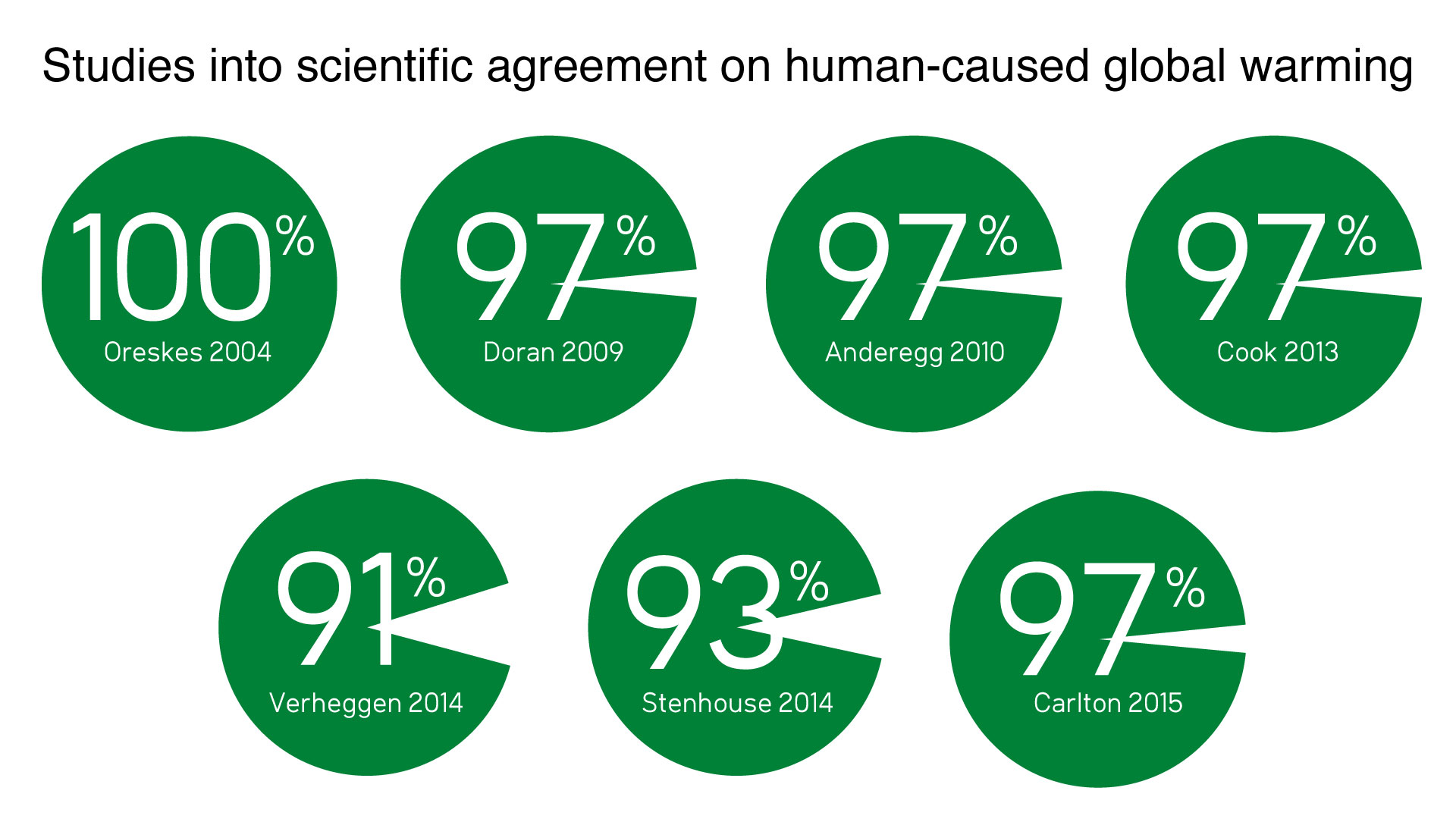
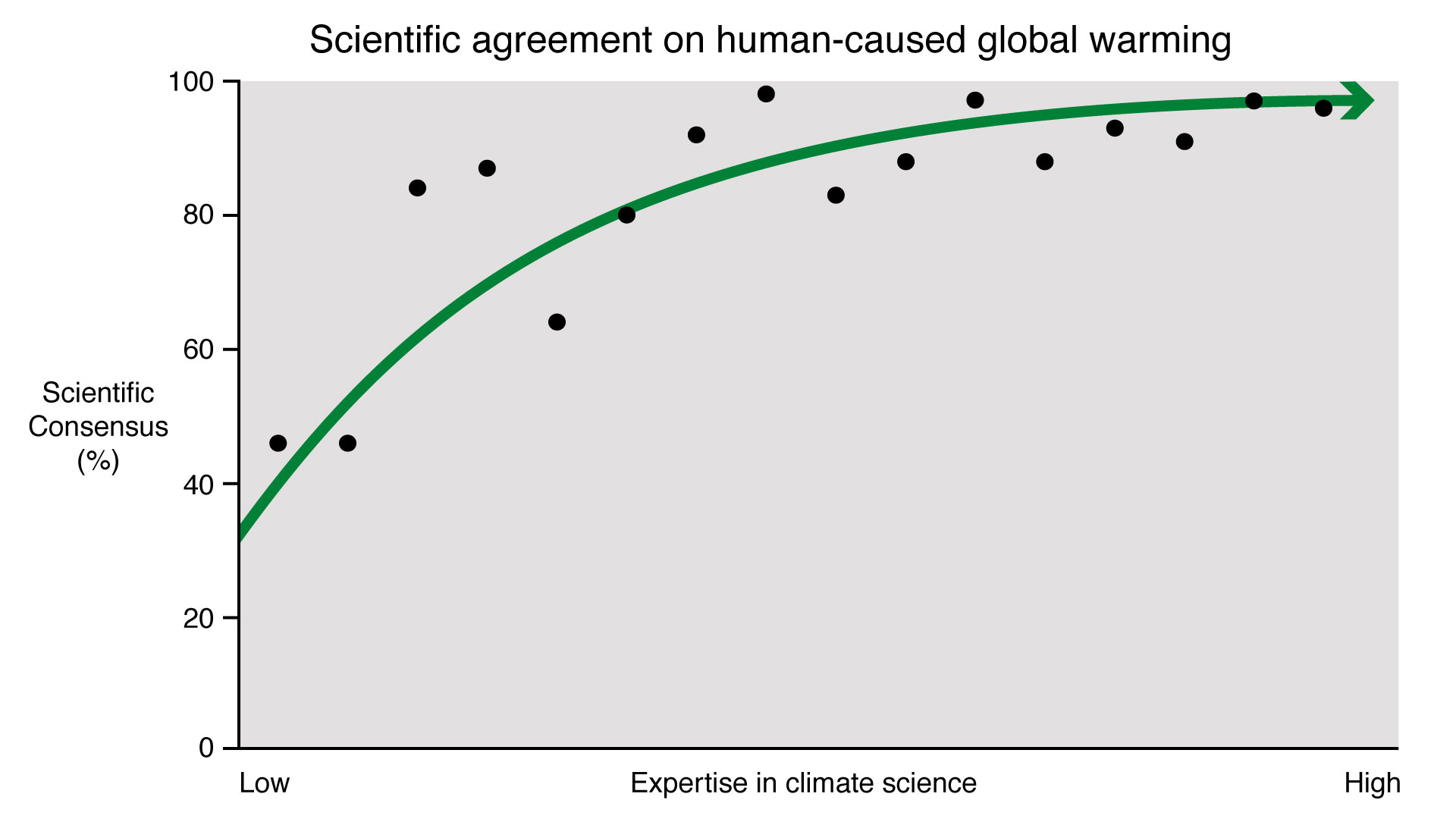
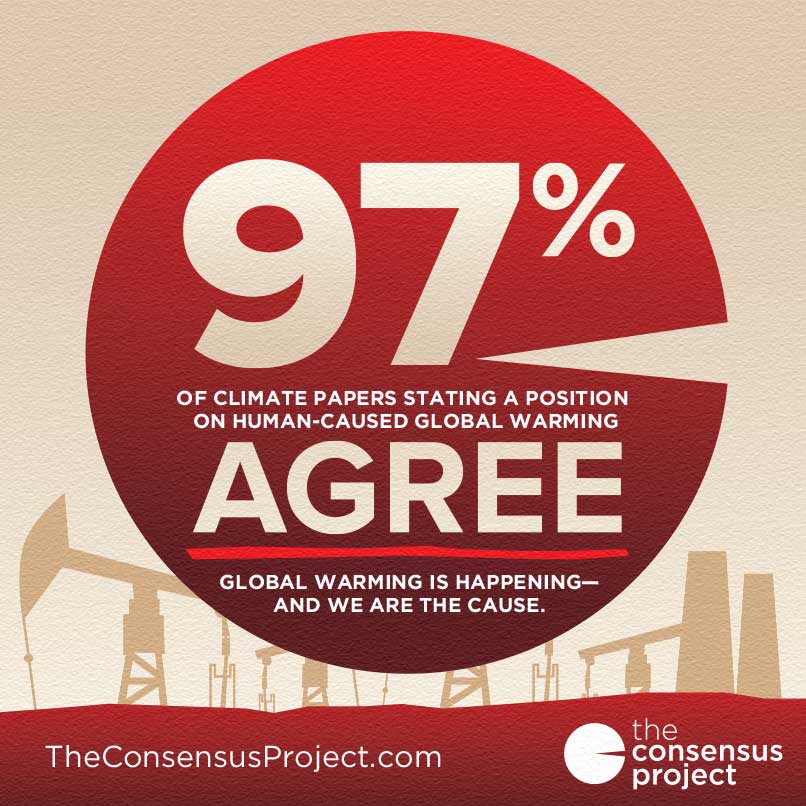

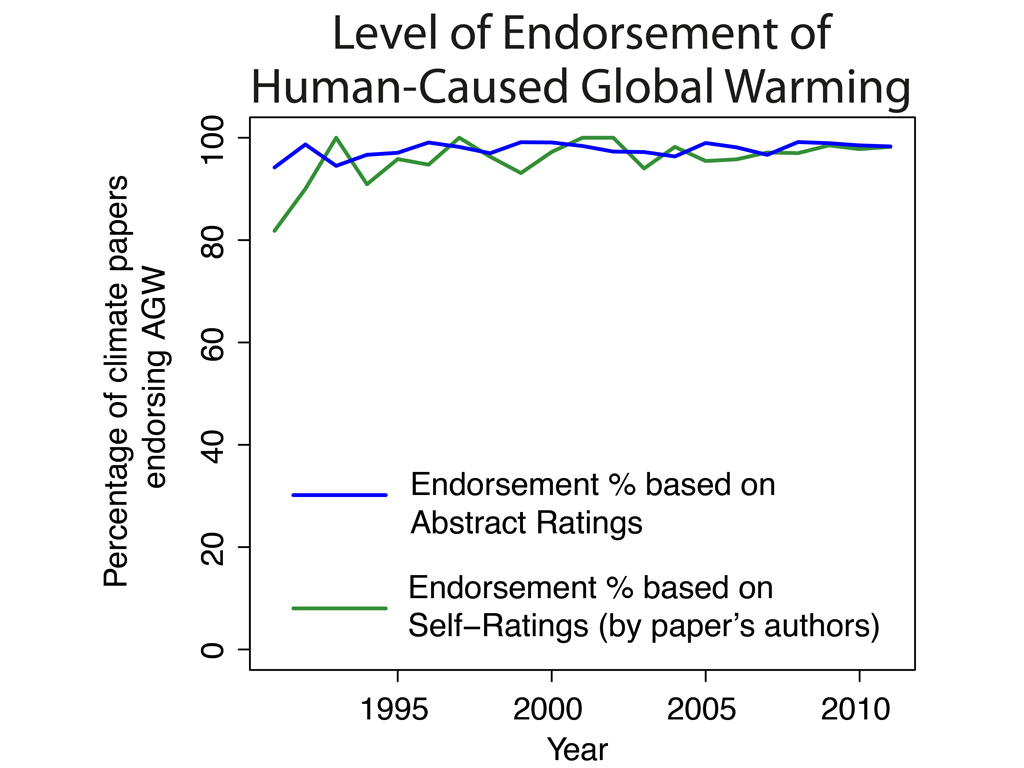
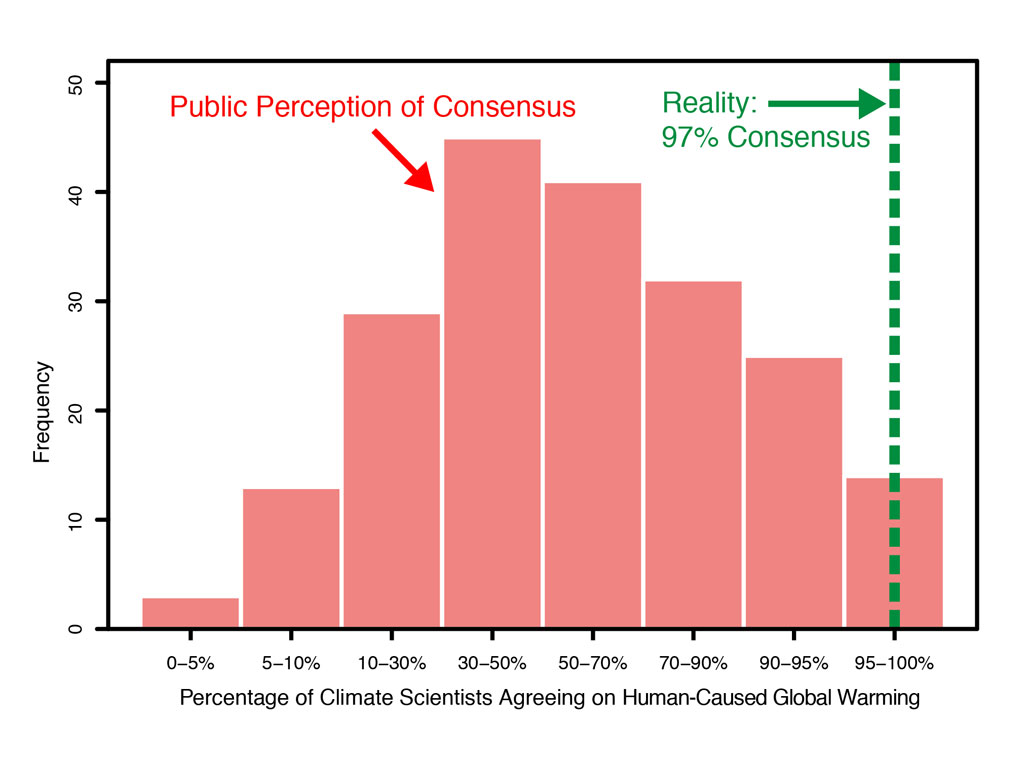
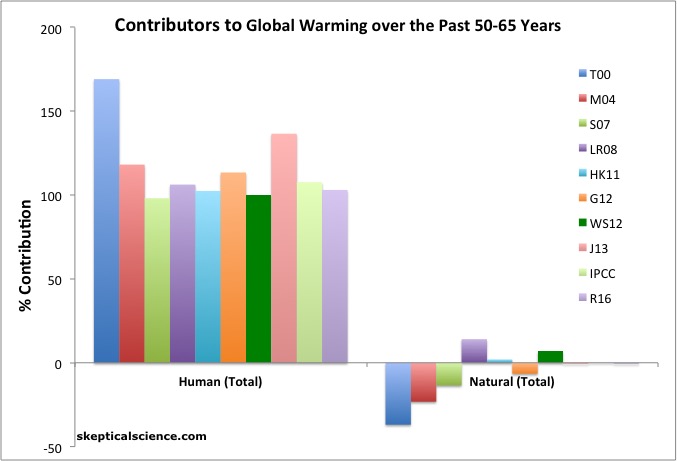







Climate Myth...